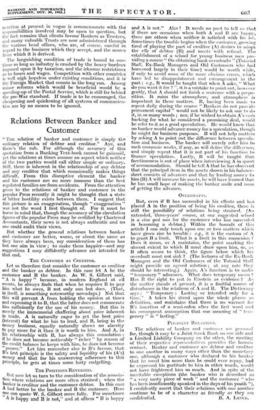OVERDRAFTS.
But, even if B has succeeded in his efforts and has placed A in the position of being his creditor, there is still the possibility of relations being strained. (An extended, three-years' course, at our suggested school is a- Sine qua for the customer who has succeeded in becoming a debtor.) Within the bounds of thus article I can only touch upon one or two matters which have given rise to trouble : e.g., it is the custom of A to grant B a limit. What is a limit in this connexion ? Does it mean, as A maintains, the point marking the utmost extent to which B must draw upon him, or, as B often seems to think, the figure below which his overdraft must not sink ? (The lectures of the Ex-Bank Managers and the Old Customers of the Tutorial Staff might provide an agreed solution ; at any rate they should be interesting.) Again, A's function is to make " temporary " advances. What does temporary mean ? Has B the right to put in Einstein as evidence ? As the matter stands at present, it is a fruitful source of disturbance in the relations of A and B. The Dictionary says : " Temporary : Lasting -or intended only for a time." A takes his stand upon the whole phrase as definition, and maintains that there is no warrant for B's insertion of a semi-colon after the first word and his consequent assumption that one meaning of " tem- porary ' is "












































 Previous page
Previous page